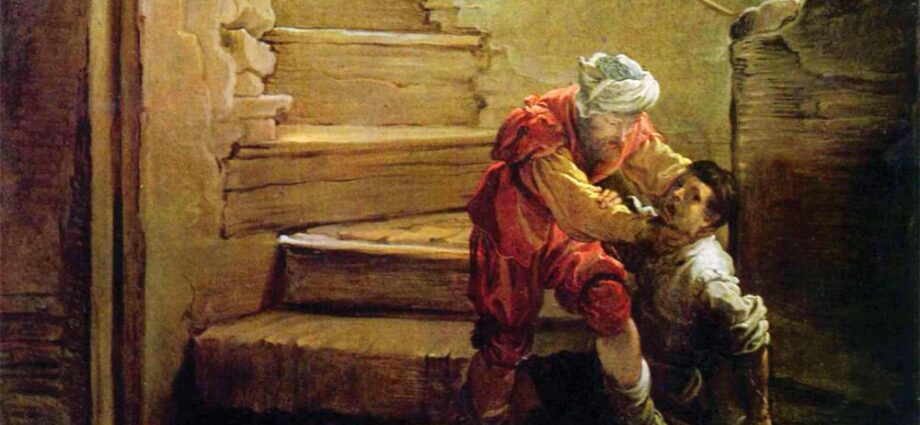In this morning’s Gospel, we see a servant brought before the king who “owed him a huge amount.” In the original text, it gives us that amount as being “ten thousand talents.” A “talent” is a measurement of the weight of gold, silver, or copper. It varied but was approximately 60 to 90lbs. Therefore, ten thousand talents would be about 204 metric tons of precious metal. Depending on which metal was used, a talent was the equivalent of about 6000 denarii, which would make the first servant’s debt 60,000,000 denarii. The average wage of a servant was one denarius a day.
This means that the first servant owed what would take a day laborer 164,000 years to repay. In modern terms, the average daily laborer makes around 15 dollars an hour in America. That means the servant owed 7.2 billion dollars to the king. So when it says he owed a large sum, that’s what it’s saying. He owed more money than he could ever pay back in a lifetime, even in many lifetimes.
(This math and much more is available in the book Stories with Intent: A Comprehensive Guide to the Parables of Jesus)
The king then has mercy on him and forgives his debt. How beautiful is that? This isn’t a negligible debt, not something lightly dismissed. Yet, the king still just forgives it and lets him go on his way. It’s reminiscent of God’s forgiveness of our sin. God forgives us of the sins we are rightly guilty of, of things we did on our own. Unfortunately, we sometimes fall into the trap of thinking, “well, I keep doing this same thing over and over.” But God’s forgiveness has no limit.
This very parable reminds us that God forgives even the most outrageous of amounts. But there is a condition to that, one we pray for at every Mass, and a condition the servant didn’t bother to follow.
That condition is this: forgive us our trespasses, as we forgive those who trespass against us. The servant this morning who was forgiven by the king for an amount beyond what almost any of us could ever have any hope of paying back then goes out into the world and finds someone that owes him money. Instead of forgiving him or being lenient, he demands his money. It says he chokes the man and throws him into prison! All for 100 denarii. Roughly 12,000 dollars. Yeah, that’s still a bit of money, but it’s minor compared to the original debt!
All of this is finished off with Jesus saying, “So will my heavenly Father do to you, unless each of you forgives his brother from his heart.” He reminds us that we are not just made in God’s image symbolically, but the fullness of who we are lies in mercy and forgiveness. That’s not easy. Especially if, like me, you come from a family that holds grudges. But we have to break that. We have to instead forgive, especially when we don’t want to. Not just superficial forgiveness either, but one that comes from the heart. The grace and mercy we receive here in the Sacrament of Confession and here at the altar in the Sacrament of the Eucharist is a gift for us, but not just for us to keep to ourselves. We are supposed to take forgiveness out into the world, sharing the love of God with the people we meet in our daily lives. There is a saying out there: “Be careful how you live. You may be the only Bible some person ever reads.” But it’s more than that; Our lives must become Sacramental. You may be the vessel that Jesus uses to show them His living presence in their lives, that He uses to draw them to His Church, to His presence in the Sacraments.
A reflection on the readings for Thursday of the 19th Week in Ordinary Time: August 12th, 2021

